Perspective on Reversible Diabetes -Exploring Signs, Symptoms, And Tips
Reviewed by: Dr. T S Deepthi Sarojini | Author: Manoja Kalakanti
Diabetes is a health condition that has taken the world by storm, affecting millions worldwide. With a staggering 463 million adults living with diabetes globally, it is clear that this epidemic is not going anywhere anytime soon. In the United States alone, over 34 million people grapple with this chronic condition, reversible diabetes, known as type 2 diabetes, being the most prevalent form. Sadly, it is easy to see how factors such as poor dietary choices and lack of physical activity have contributed to this growing issue.
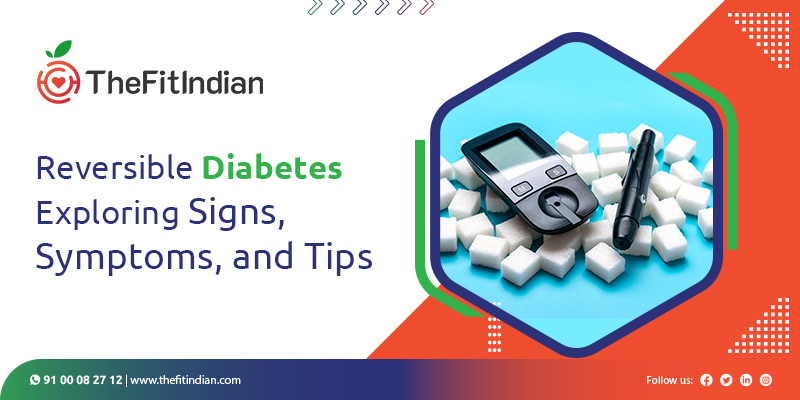
However, there is a silver lining! Research suggests that type 2 diabetes can be reversed through simple lifestyle changes. That means there is hope for you or a loved one to improve your overall health and well-being. As the predominance of diabetes continues to rise, taking proactive steps to manage and reverse the condition has become more important than ever. In this blog, we will look closely at reversible diabetes meaning, explore the signs and symptoms, and provide tips to help you manage and potentially reverse type 2 diabetes.
Defining Reversible Diabetes – Signs, Symptoms, and Causes
Reversible diabetes is a term used to describe the possibility of reversing type 2 diabetes through lifestyle changes such as diet and exercise. Type 2 diabetes is a health condition with high blood sugar levels. Unlike type 1 diabetes, an autoimmune condition, type 2 diabetes is typically caused by a combination of genetic and lifestyle factors. Here are some of the reversible diabetes symptoms and causes of type 2 diabetes:
Signs and Symptoms of Type 2 Diabetes
- Increased thirst and hunger
- Frequent urination
- Fatigue
- Blurred vision
- Slow healing of cuts and bruises
- Numbness in the hands or feet
Causes of Type 2 Diabetes
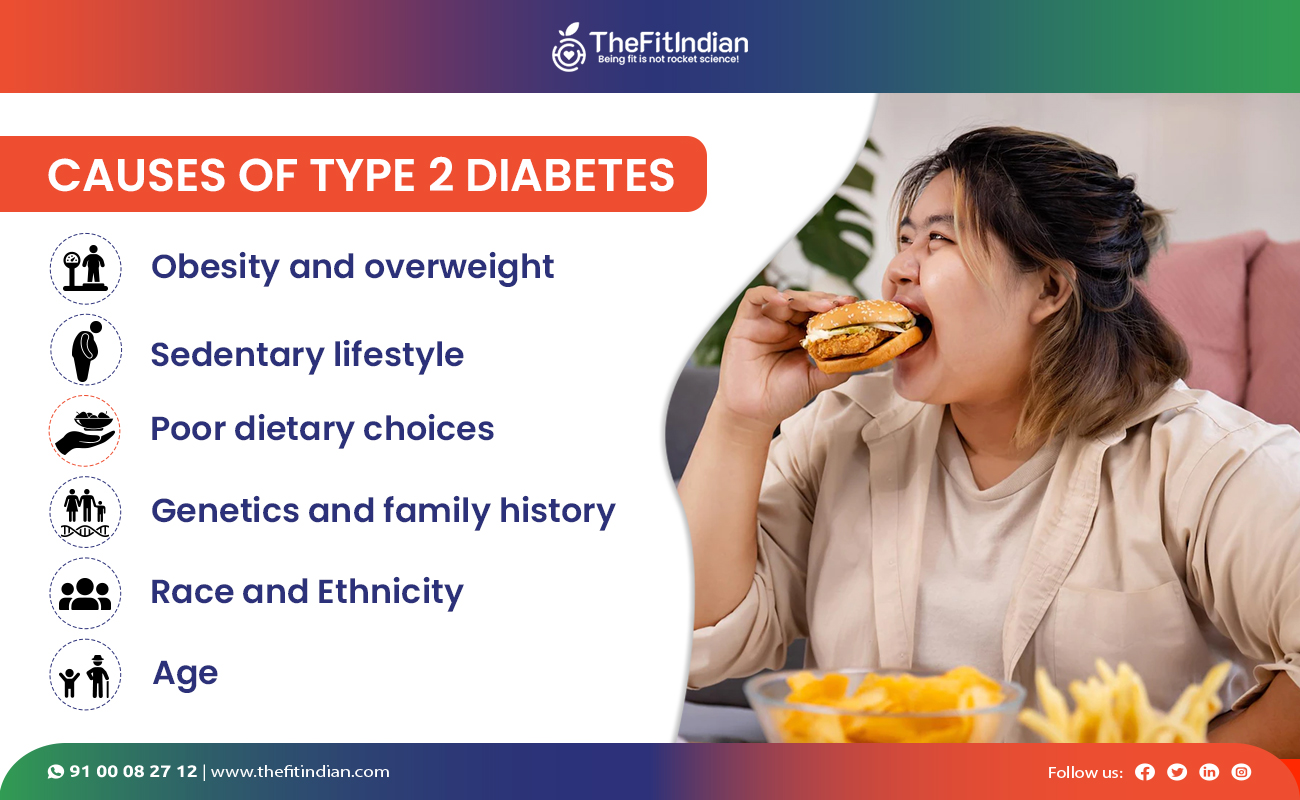
Obesity and being overweight: Excess body weight is one of the major causes of developing type 2. Being overweight or obese stresses the body’s ability to produce and use insulin, leading to insulin resistance, a hallmark of type 2 diabetes.
Sedentary lifestyle: Physical activity helps the body use glucose more effectively, so a lack of physical activity can contribute to insulin resistance. People who lead sedentary lifestyles, such as office workers who sit for long periods, are at higher risk of developing type 2 diabetes.
Poor dietary choices: A diet high in processed foods, refined carbohydrates, and sugar-sweetened beverages can lead to an increase in weight, insulin resistance, and, eventually, type 2 diabetes. On the other hand, consuming a diet high in vegetables, whole grains, fruits, lean proteins, and healthy fats can help prevent and manage the condition.
Genetics and family history: While lifestyle factors play a significant role in developing type 2 diabetes, genetics can also contribute to the condition. Individuals with a family history of diabetes are at a higher risk of acquiring the condition.
Age: The chances of developing type 2 diabetes increase with age, with individuals aged 45 or older at a higher risk. The body’s ability to generate and use insulin decreases as we age.
Race and ethnicity: Certain ethnic groups, including African Americans, Hispanics/Latinos, Native Americans, and Asians, are at higher risk of developing type 2 Diabetes.
It is important to note that type 2 diabetes is a progressive condition, meaning symptoms may not appear until it progresses. Therefore, it is crucial to be aware of risk factors and undergo regular screening if at risk. If left untreated, type 2 diabetes can cause serious health complications like nerve damage, heart disease, and kidney damage.
Is Type 2 Diabetes Reversible, and How?
The good news is that type 2 diabetes is reversible, at least in some cases. The reversal of type 2 diabetes refers to restoring normal blood glucose levels without medication or insulin injections. However, it is essential to note that not all cases of type 2 diabetes can be reversed, and the degree of reversal may vary depending on the individual’s circumstances. Here are some key factors that may influence the reversibility of type2 diabetes:
Duration of diabetes: The longer an individual has had diabetes, the less likely they are to experience a complete reversal.
The severity of diabetes: The severity of the diabetes reversible disease, as indicated by factors such as blood glucose levels, can impact the likelihood of reversal.
Lifestyle changes: Research has shown that specific lifestyle changes, such as dietary modifications and enhanced physical activity, can be effective in reversing type 2 diabetes in some cases.
While complete reversal may not be possible for everyone with type 2 diabetes, lifestyle changes can still significantly impact overall health and quality of life. The following section will explore five research-based tips for reversible diabetes management and potentially reversing type 2 diabetes.
5 Research-Based Ways to Reverse Type 2 Diabetes
It is encouraging to know that there are evidence-based steps that you can take to effectively reverse insulin resistance, high blood sugar levels, and type 2 diabetes. The best part is that these steps involve making positive, sustainable lifestyle changes that can significantly improve your overall health and well-being in the long term.
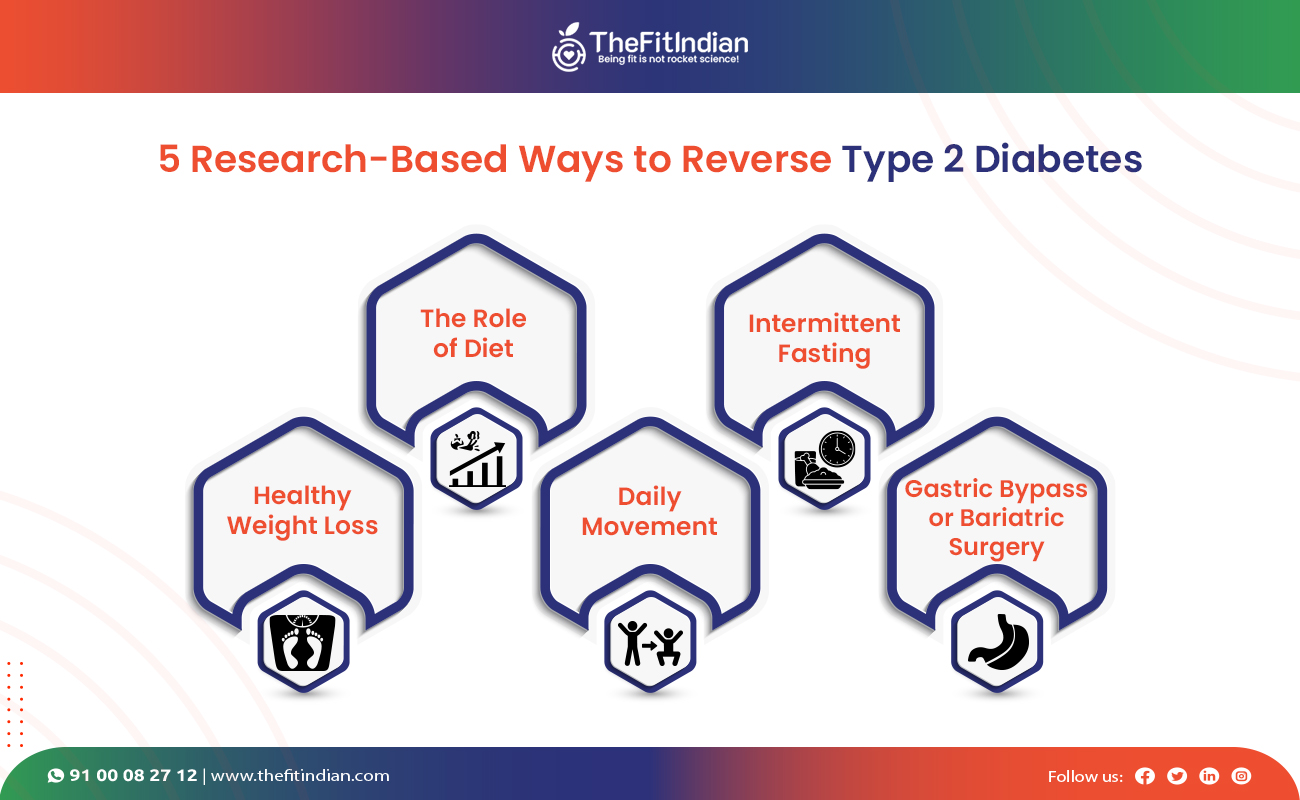
1. The Role of Diet in Preventing and Reversing Type 2 Diabetes
Your food has a significant role in the emergence of insulin resistance, making diabetes-reversible diet changes the most effective strategy to treat type 2 diabetes. Removing processed sugars and artificial sweeteners is a good place to start. Still, a low-fat, plant-based, whole-food diet is the most fantastic way to overcome insulin resistance and return your blood sugar levels to normal.
There is no need for stringent portion control or calorie restriction because this is not a “very low-calorie diet.” Instead, it focuses on meals that improve blood glucose control and insulin sensitivity. See our comprehensive diabetic diet guide to learn how to start controlling your blood sugar levels with food and experience healthy weight loss along the way!
2. Intermittent Fasting
Due to our hunter-gatherer ancestry, humans have developed the ability to go for extended periods without eating. As a result, your body initiates autophagy during intermittent fasting intervals (often 16 or 24 hours) to ensure that cells can still function.
During autophagy, your body burns extra protein, fat, and old cells, an internal recycling process. As a result, intermittent fasting regularly can be helpful for reversible diabetes by enhancing liver health, improving neurological function, lowering insulin resistance, and improving cardiovascular health.
Healthy Weight Loss
Losing weight is one of the well-heard suggestions for people with diabetes. Yet, urging someone to “reduce weight” is insufficient to reverse diabetes because you must also ensure that the weight loss is healthy and long-lasting.
That means avoiding highly low-calorie diets and drastic lifestyle changes like prolonged fasting, strenuous exercise, or risky weight-loss products that can lead to blood sugar swings and other medical issues. For this reason, we have provided the dietary plan, enabling you to achieve your target blood sugar levels and weight loss goals without experiencing any drastic changes.
Daily Movement
Increasing your exercise and daily mobility produces a beneficial feedback loop when combined with dietary adjustments. For example, your muscles can burn glucose and fat more effectively when you are more active, which lowers the amount of both in your bloodstream.
In the end, a consistent adjustment in lifestyle that includes increased activity increases mitochondrial biogenesis, which hastens the process of correcting insulin resistance and type 2 diabetes. Making positive lifestyle changes for diabetes reversal benefits your blood sugar levels and overall health and well-being.
Gastric Bypass or Bariatric Surgery
In extreme circumstances, gastric bypass or bariatric surgery can alter your digestive system by rearranging your stomach and intestines to satisfy you with less food or skipping over some digestion stages.
Along with the primary outcomes of these invasive operations, patients also reported considerably lower levels of insulin resistance in their adipose tissue. Researchers speculate this may be related to the dramatic weight reduction frequently seen with gastric bypass surgery.
Dietary Plan for The Reversal of Type 2 Diabetes
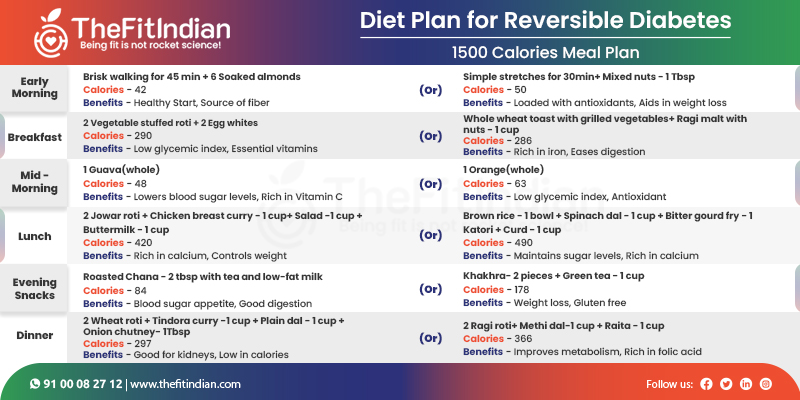
Summing Up
In a world where reversible diabetes is becoming increasingly common, it is easy to feel overwhelmed and helpless. But the truth is, you have the power to take control of your health and potentially reverse this condition. By making practical lifestyle changes such as eating wholesome foods, getting active, managing stress, and getting enough rest, you can transform your health and potentially prevent serious complications. Yes, it takes effort and commitment, but the benefits are life-changing: better blood sugar levels, reduced risk of health issues, and an overall improved quality of life. So, let us grab life by the horns and start making positive changes today!
FAQs
Yes, type 2 diabetes can be reversed through changes in lifestyle, such as adopting a healthy diet, regular exercise, stress management, maintaining a healthy weight, and monitoring blood sugar levels.
Yes, type 2 diabetes is reversible through lifestyle changes such as a healthy diet, exercise, stress management, sleep, and maintaining a healthy weight.
Type 2 diabetes can be reversed naturally through lifestyle changes such as following a balanced diet with plenty of fiber-rich foods, whole grains, lean protein sources, regular physical activity, and stress management techniques.
Reversing diabetes with lifestyle modification involves adopting healthy habits such as a balanced diet, regular exercise, stress management, proper sleep, and maintaining a healthy weight.
The length of diabetes remission varies depending on factors such as the condition’s severity and adherence to a healthy lifestyle. Therefore, it is important to continue a healthy lifestyle to maintain remission.
Many superfoods can help to reverse type 2 diabetes, such as:
Leafy green vegetables
Berries
Nuts and seeds
Whole grains
Legumes
Yes, plant-based foods such as fruits, vegetables, whole grains, nuts, and legumes have been shown to help reverse diabetes.
Type 1 diabetes is an autoimmune disease where the body attacks and destroys the insulin-producing cells in the pancreas. Therefore, it is irreversible as the body cannot produce insulin naturally.
Yes, diet and exercise play a significant role in reversing type 2 diabetes by reducing insulin resistance and improving blood sugar control.
Type 2 diabetes can be controlled through a healthy diabetes reversal lifestyle, such as following a balanced diet, exercising regularly, monitoring blood sugar levels, maintaining a healthy weight, and taking prescribed medications as directed by a healthcare professional.

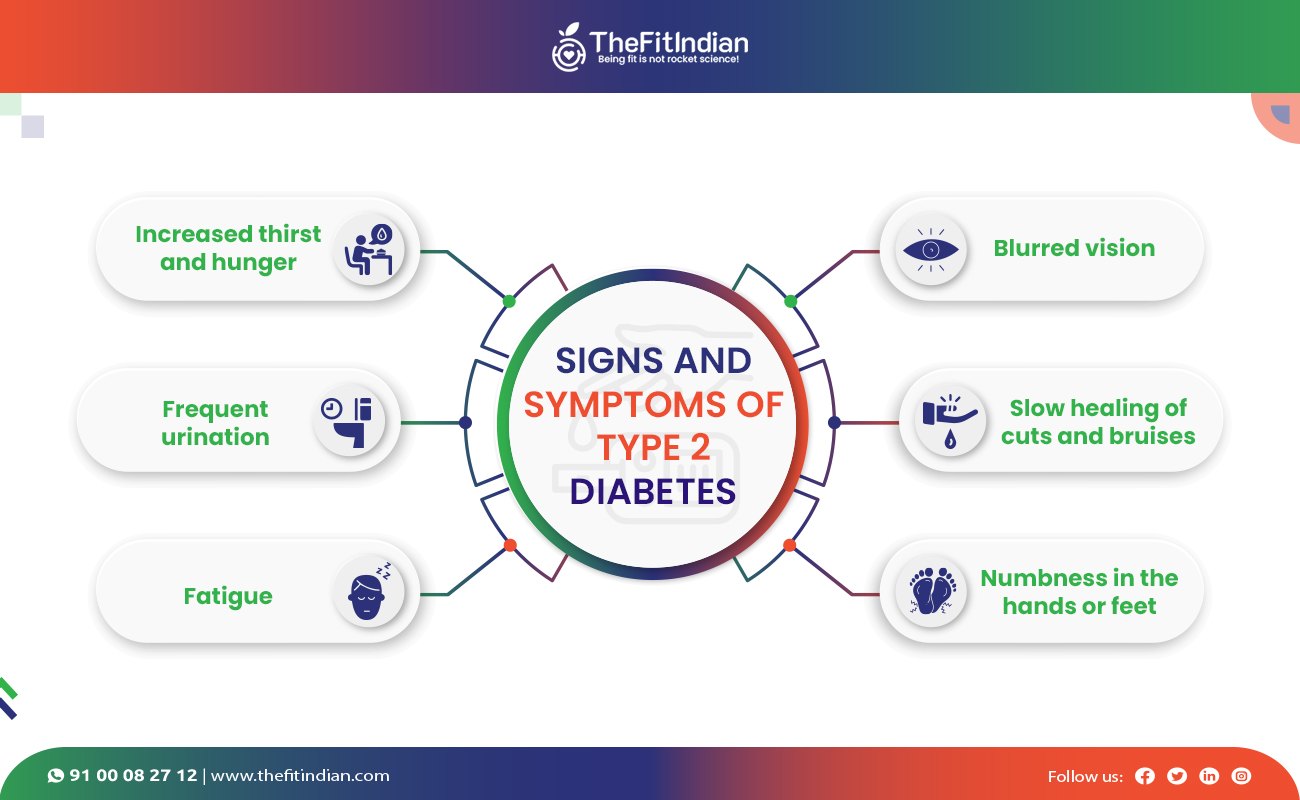



Manoja Kalakanti